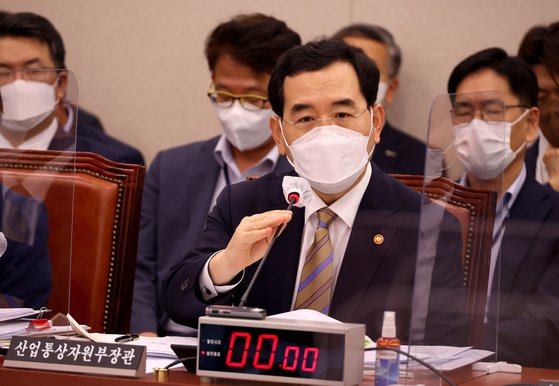
The Korean government may file a complaint against the United States with the World Trade Organization (WTO).
It says that the Inflation Reduction Act, which offers subsidies for the purchase of domestically-manufactured electric vehicles (EV), could violate trade agreements and discriminate against non-U.S. automakers.
Korea “will actively review whether to file a complaint with the WTO,” Trade, Industry and Energy Minister Lee Chang-yang told the National Assembly.
The minister told lawmakers on Monday that the ministry has expressed concern about the law to the United States Trade Representative (USTR).
“As soon as the bill was signed into law, the ministry voiced concern to the USTR about its possibility of going against the principles of the WTO and the Free Trade Agreement,” Lee said in a meeting at the National Assembly.
Lee went on to note that top diplomats, including the foreign minister, are working together to get the message across.
“We are expressing concern through different channels and routes including via the foreign minister,” Lee noted, “We plan to dispatch high-ranking officials in charge of negotiating trade to the United States this week or early next week to learn the U.S. stance.”
The ministry will send Ahn Duk-geun, Minister for Trade, to a meeting for the Indo-Pacific Economic Framework (IPEF) next week, which will be held in the United States.
Local media outlets reported that Foreign Minister Park Jin also complained about the U.S. law during a phone call with Secretary of State Antony Blinken last Friday since the new rule will exclude vehicles made outside of the United States by Hyundai Motor and Kia from state subsidies.
Vehicles they produce in the United States will be covered by the act and purchasers of them will be eligible for the subsidy.
Officials at the Ministry of Foreign Affairs declined to confirm the reports, only saying that the ministry “is exploring different ways and working together with the Ministry of Trade and local automakers to convey our message against the Inflation Reduction Act.”
Park and Blinken discussed the alliance between the two countries, North Korea’s nuclear program, and other regional and global subjects during the Aug. 19 call, according to a statement released by the Foreign Ministry. The statement did not mention the Inflation Reduction Act.
The act, which was signed into law on Aug. 16, is a sweeping package to combat climate change. It includes a subsidy of up to $7,500 for electric vehicles or fuel cell vehicles, either new or used, manufactured in North America.
The foreign minister raised the possibility of the law violating the terms and principles of WTO and the U.S.-Korea Free Trade Agreement.
“The Free Trade Agreement stipulates the principle of national treatment will be followed and the WTO requires most-favored-nation treatment,” Park said on Aug. 19 when he attended a committee meeting at the National Assembly.
National treatment requires countries to treat imported goods, services, and intellectual property the same as domestic goods, services, and intellectual property, while most favored nations require all trading partners to be treated equally.
The government is looking to develop a united front with other nations.
“We are in discussions with EU countries — especially Germany — because German carmakers face a similar challenge to that of Korean manufacturers,” said an official from the North American trade policy division at the Ministry of Trade, Industry, and Energy.
Hyundai Motor and Kia manufacture the Ioniq 5 and the EV6 in Korea. Hyundai Motor announced it will spend $5.5 billion to build an EV-dedicated factory in Georgia, but mass production will not start until 2025.
Vehicles made at the U.S. factory will be eligible for the subsidy.
Many of the models benefiting from the law include those made by GM and Tesla.
BY PARK EUN-JEE [park.eunjee@joongang.co.kr]

![Son Heung-min to LAFC? Tottenham Star Nears MLS Move Tottenham Hotspur and Korea national team captain Son Heung-min is pictured on March 20. [YONHAP]](https://www.koreadailyus.com/wp-content/uploads/2025/05/0516-SonHeungmin-100x70.jpg)

![‘Squid Game’ S3 Breaks Netflix Record Despite Mixed Reviews A still from the third and final season of Netflix's series ″Squid Game″ (2021-2025) [NETFLIX]](https://www.koreadailyus.com/wp-content/uploads/2025/06/0630-SquidGame-100x70.jpg)
